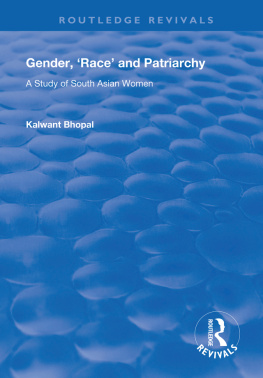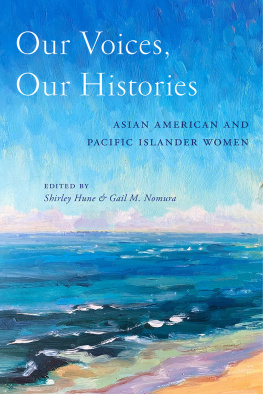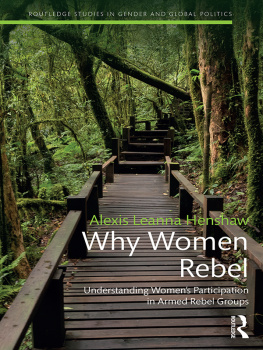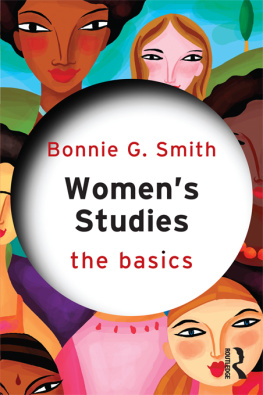Published in 1996 by
Routledge
29 West 35th Street
New York, NY 10001
Published in Great Britain in 1996 by
Routledge
11 New Fetter Lane
London EC4P 4EE
Copyright 1996 by Routledge
Design: Jack Donner
All rights reserved. No part of this book may be reprinted or reproduced or utilized in any form or by any electronic, mechanical, or other means, now known or hereafter invented, including photocopying and recording, or in any information storage or retrieval system without permission in writing from the publishers.
Library of Congress Cataloging-in-Publication Data available from the Library of Congress
Contents
1 From a Lineage of Southern Women
She Has Left Us Empty and Full of Her
Angelita Reyes
2 You Dont Live Just For Yourselves
Stories from a Chinese Woman in Atlanta
Jianli Zhao
3 More than a Mother
Some Tewa Women Reflect on Gia
Nancy Greenman
4 I Know Who I Am
The Collaborative Life History of a Shoshone Indian Woman
Sally McBeth and Esther Burnett Home
5 The Multiple and Transformatory Identities of Puerto Rican Women in the U.S.
Reconstructing the Discourse on National Identity
Celia Alvarez
6 I Have a Frog in My Stomach
Mythology and Truth in Life History
Janneli F. Miller
7 Tryin to Make Ends Meet
African American Womens Work on Brooks Farm, 19201970
Valerie Grim
8 Comrade Sisters
Two Women of the Black Panther Party
Madalynn C. Rucker and JoNina Abron
9 From the Inside Out
Survival and Continuity in African American Womens Oral Narratives
Gwendolyn Etter-Lewis
10 Hands in the Chitlins
Notes on Native Anthropological Research among African American Women
Linda Williamson Nelson
11 An Anthropological Approach to Cambodian Refugee Women
Reciprocity in Oral Histories
Lance Rasbridge
12 Like Us But Not One of Us
Reflections on a Life History Study of African American Teachers
Michle Foster
Gwendolyn Etter-Lewis
The axes of the subjects identifications and experiences are multiple, because locations in gender, class, race, ethnicity, and sexuality complicate one another, and not merely additively.
Nor do different vectors of identification and experience overlap neatly and entirely.1
Sidonie Smith and Julia Watson, De/Colonizing the Subject, 1992
U nrelated Kin is a text that breaks with custom by exclusively focusing on women of color. It places women from First World2 countries/ancestry at the center of discussion/analysis and presents their intimate views in a unique mosaic of personal narratives. Traditionally, it has been convenient for researchers and educators alike to regard women as an undifferentiated collective. However, as Smith and Watson suggest, this mistaken assumption is unproductive and misleading. No single group can represent adequately the whole of women, nor can one voice speak for all.
Scholars included in this collection of essays acknowledge the sisterhood of all women, but their primary purpose is to identify and describe distinct life experiences of women of color. Specifically, each chapter explores the significance of race3 and/or gender4 as factors which impact womens lives across a diversity of non-Western cultures. Words of women from Tewa and Shoshone societies, from Cambodian refugees, from Latina, African American, Chinese American, and other cultures testify to the particulars of their circumstances/ status, both within and outside their respective communities.
As a whole, this book challenges the status quo in research and pedagogy as it grapples with controversial issues in the study of life histories. Conceptual, theoretical, and applied research from multidisciplinary perspectives refine and clarify ideas previously unexplored or unexplained in detail. Ultimately, in this text readers will find innovative ways of reconceptualizing the complexities of womens lives.
DENIAL
Coupled with issues of race and gender is the question of denial. That is, the publics tendency to ignore unequal treatment of different races of people and women in the work place, in educational settings, and in social situations.5 Blinded by the timeworn myth that the U.S. is a genderless melting pot,6 society takes solace in the false security such an illusion creates. It is both easier/safer to say that skin color and sex do not matter in the scheme of American life, than to question the contradictions induced by such a noble concept.
In spite of this convenient fiction, Toni Morrison has observed that the U.S. is a race-conscious culture and asks:
What happens to the writerly imagination of a black author who is at some level always conscious of representing ones own race to, or in spite of, a race of readers that understands itself to be universal or race free? How do embedded assumptions of racial (not racist) language work in the literary enterprise that hopes and sometimes claims to be humanistic?7
In other words, what is the impact of an audience/nation assuming itself to be racially neutral when, in fact, it is acutely conscious/aware of race and also of gender? On the other hand, are there universals that really apply to the non-Western world? Marimba Ani (Donna Richards) answers this question when she suggests that:
Once individuals are persuaded that universal characteristics are the proper human goals, European patterns and values can be presented as universal, while others are labelled as particular. Then European ideology can be proselytized without the appearance of imposition, invasion, conquest, exploitation, or chauvinism.8
She maintains that what we know as universalism is really a disguise for European cultural imperialism informed by self-interest and oriented toward conquering inferior others. In sum, both Morrison and Ani propose that certain ideologies not only promote a nave and unsympathetic view of human relations in the U.S., but also mask more important issues of race, and by extension gender, that tear and warp the basic fabric of society.









